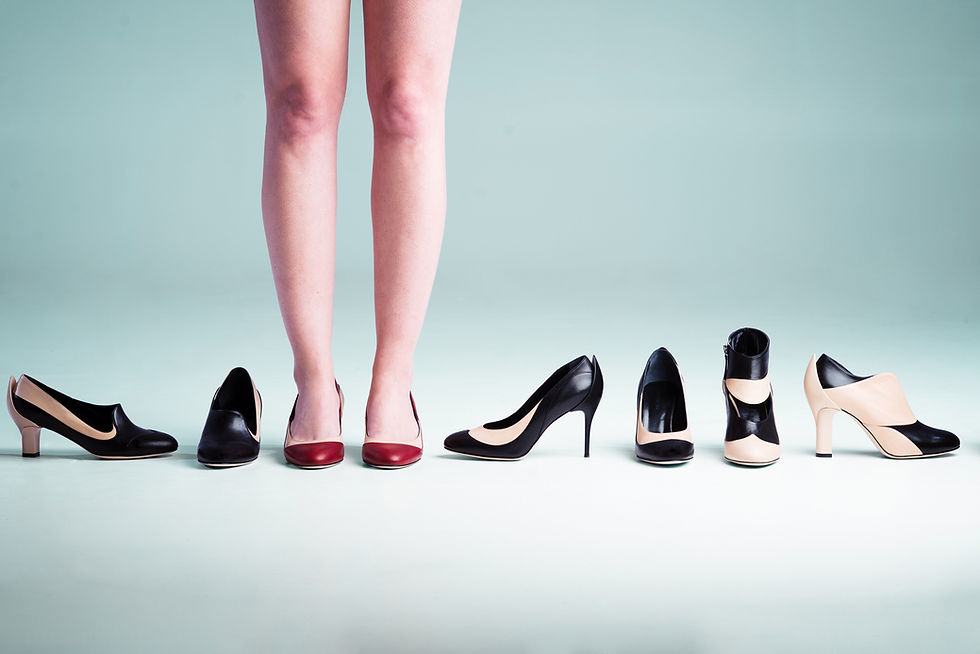Opinion: Shopping Sustainably - What We Can Learn from Children.
- sales53280
- Aug 28, 2021
- 7 min read
Updated: Aug 31, 2021
Anno 2021, caring about the environment and building ESG (environmental, social, and corporate governance) into your strategy, is expected from companies in any industry. It doesn't matter whether it is construction, food, electronics, or fashion, people - especially Millennials and Gen Z - expect brands to care. Not all industries are approaching the problem equally profound. For many companies, marketing became the ideal tool to patch up the brand's reputation without changing anything fundamentally. Many (fast) fashion brands have mastered the skill of greenwashing. There are plenty of examples out there, so I won't repeat them here, except for two recent examples that made the news.
Shein is the new kid on the 'fast fashion block'. The billion-dollar company has consistently been copying creations from small fashion brands and designers without giving credit or paying royalties to them. As backlash accumulates regarding their unethical practices, they are trying to polish their reputation by launching a contest for young designers to show they 'care' about young emerging talents. It doesn't take much strategic thinking to see through this charade and understand how the portfolios of thousands of graduating designers who apply will be an infinite source for them to copy from. A prime example of poor corporate governance.
Another example - from the sustainability aisle. Many luxury brands have been cornering the terminology 'sustainable luxury'. While in itself, sustainable luxury, is a good trend, a lot of traditional luxury brands put the sustainability aspect of it in the shoes of the customer, and just stay in the luxury lane themselves. Without making any fundamental changes, they claim to care about sustainability simply because they sell high-quality items for a high price that people tend to keep for a long time. And the longer the lifetime of a product, the more justified the environmental impact of that product is. Good marketing, but it won't make a difference to the environment.
However, are the brands the only ones to blame? How much responsibility lies with them versus the customer? Most of us are somewhat aware of the damage the fashion industry is doing to the environment while perpetuating inequality. Yet, many still see no harm in buying cheap clothing to wear for just one season. Sensitizing news stories and Netflix documentaries don't seem to have too much of an impact when it comes to our shopping behavior. The rush we get from buying something that looks good on us prevails. How much of it is our culture? It recently dawned on me that we (the adults among us) can learn a thing or two from watching the spending behavior of kids.
Not too long ago, I was observing a little boy and his parents at a market. He got a few bucks from his parents to spend on anything he wanted. He thoroughly looked through all his options, ending up not buying anything, but saving the money so he could buy something bigger or more expensive next time. He reminded me of myself when I was a kid. Just like him, as a little girl, I remember saving up for something I really wanted. More often than not, it was something I didn't really need, so my parents didn’t want to buy it for me. While at the time, I probably threw a little tantrum for not getting what I wanted - today, I totally agree with their stance. I don't just agree, I think I actually learned a few things from it: I learned to save up for something, have patience, but also experience that special feeling of in the end buying what I wanted and treasuring it. A feeling most of us lost as we grew up and made enough money to buy what we want when we want it. Especially as many brands on main street have made it their specialty to make knockoffs that are affordable to everyone.

Do you remember what you saved up for as a kid? A stereo installation? A bike? A special doll? A movie? Befitting the amount of time and money you had to save for it, you may even remember what happened to it. Or you might still have it. At least, that is how it is for me. As a little girl, I saved up for bricolage materials and books (I still have them all). At an older age, 15, I remember saving up for a skirt. My mother didn’t think I needed it. She was right, but I really wanted it. It was too expensive for me, but after saving for a while, I bought it. And I still have it – almost 20 years later - I even still wear it. It is still in shape because it was of good quality and timeless design. (Unfortunately, the fashion label itself didn't survive the financial crisis.) Every time I wear that skirt I am reminded that I saved up for it to buy it.
A little different, but in the same spirit. With my last wage as a PhD-student before starting my own business, I bought a dress: an expensive but exquisite and high-quality dress. Well worth the money taking into account the design, materials, and quality. I treasure that dress; I am always very careful with it. We have lost sight of those two things: A deeper significance and respect for our belongings - especially clothing. A while ago in history, people had very few clothes. Back then, clothes were more valuable and comprised a lot of the monthly income of a family. People would repair them or have them adjusted for someone else - friends or family - if they no longer fitted. Today, we can buy a T-shirt for less than 1% of our monthly salary. Why would we care about it? Why would we try to repair it if it is torn? That is often more expensive than buying something new. The consequence is: we don’t care about our clothes anymore, or not very much. We accumulate in our closet more clothes than we can wear. We buy something we like, not necessarily love.
The requirements for a garment to be bought are pretty low. According to a recent study, women on average keep or actively wear a garment for only five weeks, after which it disappears in the back of a closet or the garbage. We also buy - often unknowingly - lower and lower quality. Those garments are worn out in a very short time frame as you wash them a couple of times. After one season or less than ten times wearing it, you throw it out. Only to restart the cycle, and replace them with new clothes with no value or significance. You may even be one of those people who buy three of the same shirt, because it is convenient, or you get a discount.
It is unfortunate – I have to admit – that price and quality are not always proportional. But cheap or expensive, we usually don’t really know what we buy. And that is the real problem. If you would start consuming again as the 12-year old you – who saved up for the latest Gameboy or dollhouse, you would know what you were buying. As a kid, you did an ‘elaborate’ study on what exactly you wanted: Where you could buy it, where it came from, why the similar cheaper products were not as good as what you wanted. You contemplated whether or not it was worth spending your money on something now or smarter to wait to spend it on something better later. Now we just buy and own too much to really know what we buy or own.
As a kid, you probably even built up a lot of arguments on why you needed it. Primarily that was to convince your parents to buy it for you. And if that failed, it was to justify for yourself, why you were going to spend your hard saved money on it. And then you bought it, and you treasured it. You didn’t want your sisters or brothers to break or damage it. You had respect for it.

I liked that feeling. And ever since I started my own shoe label, I found that feeling back. I only buy things that are really valuable to me. That I can justify for myself to spend money on, and that I know will last. I don’t buy clothes from brands when I can’t track down where and how they are made. I don’t mind saving up for it. We teach our children that they can’t get everything they want, to prevent them from growing up spoiled. I don’t believe I have to get everything I want, not even for myself. There is nothing wrong with treating yourself to something special from time to time, but if you do that too often, "something special" starts to feel normal. Getting something you want, is more rewarding if you don’t get everything you want.
You could compare it to buying things for a special occasion. In case you got married, you probably remember what your wedding dress or suit looked like. (I hope so.) Chances are high that you even know what you were wearing for your Communion when you were 12. It is/was a big deal. It was your day and it required a special outfit. Maybe you even remember what dress or shoes you bought for your first prom, graduation, last New Year’s eve, first job interview… A closet filled with clothes that only have this special significance, that you respect and take care of, you know where, when, and why you bought them, clothes and accessories that have a story or memory attached to them. I like that idea and after 7 years of shopping that way, pretty much my entire wardrobe consists of dresses, skirts, and shoes with a story.
Katrien
Founder Elegnano



Comments